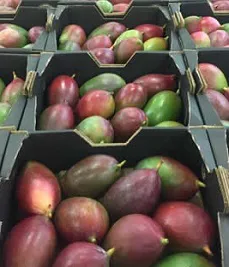 South Africans love mangoes and for the past month, they haven't had to wait for the start of the local season because this is the inaugural season of Brazilian mango imports to South Africa.
South Africans love mangoes and for the past month, they haven't had to wait for the start of the local season because this is the inaugural season of Brazilian mango imports to South Africa.
The first large shipment arrived on 20 September, after initial trial volumes by air on 29 August to finalise phytosanitary arrangements. Retailers are expecting future shipments to start arriving earlier.
More containers are on the way from Brazil’s São Fernando Valley, intended to supply the South African market until domestic production picks up steam, which usually is around the end of November or early December.
Food Lovers’ Market stores were the first to stock the Brazilian Tommy Atkins. They are well-placed as a result of their existing relationship with a Brazilian lime producer with a mango packhouse. Other large retailers will carry the mangoes from next week.
There’s a 35% duty on the imported mangoes, which makes it more expensive than local fruit. To keep unit price down, imports are focusing on count 12 mangoes (which are smaller than consumers’ preference for counts 8 or 9 during peak season). All mangoes are class 1 fruit.
“The exchange rate also plays a large role and coupled with the import duty, it just wouldn’t be economically viable to import mangoes when the local season is running. We’d never import mangoes during the domestic season,” says JP van Tubbergh, import manager for FVC International, international trading arm of Food Lovers’ Market. “Imported mangoes just couldn’t compete with local fruit on price.”
The Brazilian industry finds South Africa a good outlet for its Tommy Atkins, which is losing favour in the Northern Hemisphere to fibre-free varieties. After an average of 5 days transit time within Brazil, shipments across the Atlantic to Cape Town take around 10 days.
The local mango industry has expressed some reservations about the new market access. The chairperson of the South African Mango Growers’ Association, Pieter Buys, says that he was quite surprised when hearing about the new agreement for the first time some weeks ago. “We just hope they don’t import an inferior product that damages the local market right before the start of our season.”
